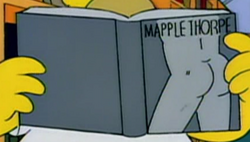
Mapplethorpe
Mapplethorpe
| ||||||
Book Information
|
Mapplethorpe is a book with a collection of photographs by Robert Mapplethorpe.
History
Marge and Homer noticed the spice fading from their love life, so they went to Books! Books! And Additional Books! to find a book that could improve their marriage. At the store, Marge and Homer looked in the "Marital Relations" section, while Bart and Lisa shopped on their own.
When the kids returned from their shopping, Marge and Homer were embarrassed to be caught looking at books about sex. They quickly grabbed other books at random so they could pretend they were looking at something else. Homer ended up with a copy of Mapplethorpe. When Bart asked what Marge and Homer were looking at, Homer answered, "I was just pursuing my interest in — Aagh!", cutting himself off and screaming when he saw the pictures in the book.
Behind the Laughter
- Robert Mapplethorpe (1946–1989) was a gay photographer whose works were famous for their homo-erotic nature and triggered much debate about censorship and the public funding of artworks.
Appearances
Books! Books! And Additional Books!
| ||
|---|---|---|
| Mapplethorpe • Mr. and Mrs. Erotic American • Sane Planning, Sensible Tomorrow • Tanks of the Third Reich • Unidentified Flying Outrage! | ||

